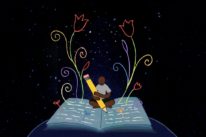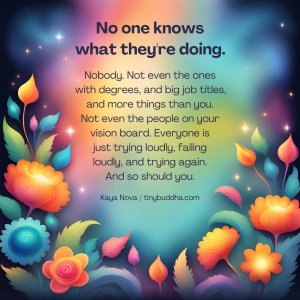
“We all exist in our own personal reality of craziness.” ~Alejandro Jodorowsky
Most of us have heard stories of “crazy” women (and sometimes men) and psycho exes. They are our friends, boyfriends’ exes, family members, and sometimes they can even be us.
Often people (including ourselves) are quick to judge these people. We write them off as emotional wrecks. We label them. We shame them. It’s hard not to judge when we are not equipped with the tools to deal with behaviors we don’t understand.
It’s even harder to feel empathy when we experience suffocation and feel our boundaries are being violated.
But “crazy” behavior might not always be what we think. Sometimes crazy behavior is a symptom of trauma and pain. A lot of times crazy behavior hides deeper issues.
From the moment we are born we start to develop a sense of self and belonging. We start to develop an idea of whom we are, how others feel about us, and where we fit in the world.
Our first feelings and ideas of self come from the relationship we have with our parents.
Generally speaking, if children have healthy parents and feel loved and secure at home, they will grow up secure and will have secure adult relationships.
But if children come from homes where there is any type of trauma, abuse, or abandonment, where they don’t learn to build a secure sense of self, then they will grow up anxious and insecure and will have difficulty trusting others and themselves.
Most of the time, people who act “crazy” are subconsciously playing out their childhood wounds. These wounds need to be worked through; otherwise, they continue to manifest over and over again with every new relationship.
Craziness is simply pain turned outward.
For as long as I can remember I have felt pain and fear of being alone. My father’s abandonment made every relationship a search for a part of me I felt was missing, but I didn’t quite know what it was.
I have always had long and fulfilling friendships with both women and men, but for as long as I can remember I have a hard time with romantic relationships. Don’t get me wrong. I absolutely love men. I just didn’t know how to relate to them until recently.
My romantic relationships have always been somewhat like this:
“Hi. I am Brisa. I think I love you. Please complete me and fulfill every part of my life that is in need of fulfillment. Allow me to focus obsessively on your life to subconsciously avoid fixing all that is wrong with mine. And let me suffocate you with my love because I don’t think I am worthy of yours, and because I am terrified of you leaving.”
Not surprisingly, men kept leaving.
And when they left, my crazy behavior kicked in full force. I couldn’t handle the abandonment. I would chase and beg and humiliate myself in every city and every country we would be in. I didn’t care.
The thought of being alone again, abandoned by yet another male, would consume every rational thought in my brain, and before I knew it only the irrational ones were left.
The ones that kept screaming “Go to his house! Show up half naked and with flowers. I am sure that’s exactly what he wants right now!” Didn’t work? “Go to his work. Show up uninvited and beg him to take you back!”
If you can think of any crazy behavior, I have probably done it. And I have probably done it more than once. I threw away my dignity and destroyed my reputation. All fueled by fear and pain, and in the name of love.
I knew my behavior was unhealthy, but I couldn’t stop. It felt as if I was trapped inside my own body and had no control over my actions. I could see what I was doing. I could even despise my actions. But I couldn’t stop.
The pain and fear of being alone was so intense that it would overpower my desire to overcome my destructive patterns.
It’s hard to see clearly when we are caught up in the cycle of unhealthy relationships and denial.
Many of us choose partners that will play the specific role we want them to play so that we can continue to relive our past with the hope of having a different outcome, thereby healing our old wounds. But subconsciously, we all know that’s not possible.
Some of us just choose to continue to act in the same ways because we know that if we were in a healthy relationship and in drama-free life, we would have no other option but to spend our time actually dealing with our pain and wounds.
Wounded people keep creating drama to keep avoiding themselves.
It took years, countless tears, and major loss for me to realize there was something in me that needed to change. It took to years to accept my wounds and my need to look deeper into myself.
I could no longer live with the reality I had carelessly (but repetitively) crafted for myself.
I couldn’t stand others thinking I was crazy.
I couldn’t stand that to his friends (and everyone he met) I was the crazy ex girlfriend he couldn’t get rid of.
I couldn’t stand who I had become, even though I knew that’s not who I was.
And most importantly, I was tired of playing victim. I knew I could no longer let the ghost of my father ruin my future relationships.
When we spend years thinking of ourselves as victims of a sad childhood, bad people, and bad luck, it becomes part of our identity. I had to learn to take responsibilities for my actions and had to learn to rewire my brain into accepting my role in every circumstance of my life.
Maybe some of the people we date are self-absorbed narcissists not worthy of our love, but that does not make them responsible for the way we act and the way we choose to live our lives.
It’s possible that, like us, they are just less than perfect souls with their own traumas and wounds to heal. They are not responsible for our crazy behavior. And they are definitely not responsible for saving or “fixing” us.
At some point we have to accept our past, our less than perfect childhoods, and we need to seek help so we can heal the wounds that haunt our adult lives.
For me, that help came through friendships, meditation, and writing.
My friends helped me through the nights I couldn’t bear spending alone, while meditation helped me during the times when all I wanted was to be alone but didn’t know how. And writing helped me organize my thoughts and all the erratic emotions that consumed my daily life.
I was never taught how to be alone. The thought of having to sit with myself and work on what was really hurting me was terrifying. But once I took that first step toward healing, the journey became addicting.
As I learned to control my impulses and erratic behavior, I felt my inner strength for the first time.
I could literally feel my muscles getting stronger each time I overpowered my urge to text, to call, or to get involved with other unhealthy men just to fill the void, and to continue the emotional roller coaster I was so used to riding.
Waking up is hard. It requires us to look deep into ourselves and confront our darkness.
Coming to terms with our shortcomings and flaws is brutal. But to some, like myself, the realization that we can’t go on as usual doesn’t come until we are drowning in our own self-created problems and we have no other option but to dig ourselves out before it kills us.
And I am glad I did.
The disruptive storm I created for myself throughout the years ultimately propelled me out of the dark and crazy hole of fear, and into the sane, consciously aware world of self-acceptance and self-love.
Fighting couple image via Shutterstock
About Brisa Pinho
Brisa Pinho is a project manager, aspiring writer, and single mother of a baby boy. She lives in Los Angeles and when she is not changing diapers and putting out temper tantrums, she is drinking wine and over-analyzing her life. She can be found at www.singlemomoutloud.com, where she shares the joys and desperation of single life and motherhood.













 Though I run this site, it is not mine. It's ours. It's not about me. It's about us. Your stories and your wisdom are just as meaningful as mine.
Though I run this site, it is not mine. It's ours. It's not about me. It's about us. Your stories and your wisdom are just as meaningful as mine. 